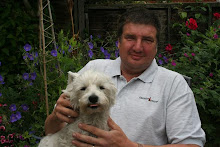Never one to sit around for too long without an 'improving book' in her hand, Liz has hunted down an on-line History course to study. Readers who know Liz at all with know that she thrives on such stuff, immersing herself in pains-taking study, sweating on essay deadlines and agonizing over how well she would do in exams (generally much better than she will admit to beforehand). She did her Open University degree like this , back in the day, graduating in year 2000 (with a 1st with distinction, no less!) and since then doing an MA course and various units of Law and of Business Administration.
This one, I have to say, is no such serious high-falutin' stuff and will not end up in a qualification; it is a bit of fun with weekly quizzes and, as Liz says "a pat on the back" and a certificate if you finish the course. It grips you for just 6 hours or so a week, as opposed to the 20-odd of Open University and has been created by a University of Virginia professor, Philip Zelikow, one of the History experts appointed to the 911 Commission charged with ascertaining why USA had arrived at the events of 911.
The course is called "The Modern World; Global History since 1760". Now, I'm no History scholar so bear with me while I sum up, paraphrasing Liz's 'precis' (and allowing her to read this before it gets too set in concrete). This is world history from early Industrial Revolution onward, so includes the early pre-steam power, pre mill machinery stuff like seed drills and the increases in agricultural production. It includes a lot of social change around revolutions in France (Egalité, Fraternité etc), in the USA (no taxation without representation!) and includes a lot of stuff around Europeans going global, empire building and moving around to settle in far flung parts.
There are changes in how power is generated and used (men, slaves, levers, donkeys and so on, through to burning of fossil fuels) and massive changes to society - from Village/Manor based society where your own existence might be perilous (One cut, one infection with flu might be your lot) but the village tended to be solid, changing to a situation where you, personally, might be more secure but the villages and small communities waxed and waned more with increased mobility. Subsistence farming was replaced by a system where you could produce excess to sell.
Anyway, there it is. Liz is bubbling with it. Wish her luck.
Tuesday, 15 January 2013
Back to Skool
Labels:
911 Commission,
History,
law,
Open University,
Philip Zelikow,
seed drills,
The Modern World
Subscribe to:
Post Comments (Atom)



1 comment:
An interesting interpretation of "fun" to us non-scholarly types, but I'm sure will keep Liz quiet for a number of long and cold winter's evenings - Enjoy!!
Post a Comment